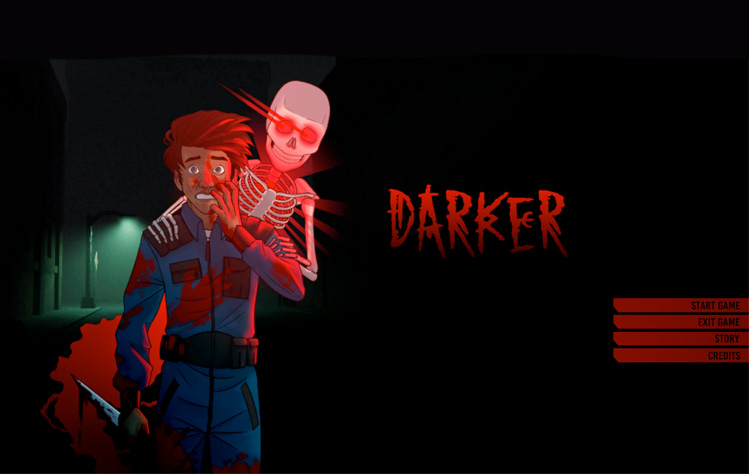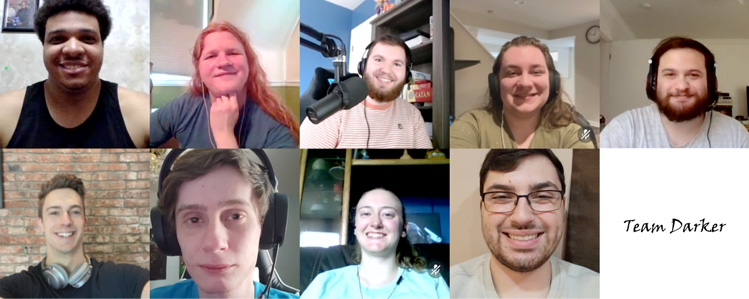Game Design Students Publish Indie Top 10 Video Game 'Darker'
June 25, 2021

There are many in the gaming industry who hope to work on a game that becomes an instant hit and creates a lot of buzz and chatter in the gaming community. For five Webster students, they reached that goal before graduating from the School of Communications. Their game “Darker” has been downloaded more than 800 times and earned a spot in itch.io’s top 10 most popular games for more than four days in a row.
Work is now underway to expand the Windows-based psychological thriller’s audience by porting it to other platforms.

Game design major Zach Ridings, who will graduate in the fall, collaborated with eight other students — Justin Bryant, Meghan Elder, Austan Harris, Danny Hook, Liam Hanson, Tony Koudys, Jasmin Sadikovic and Jackson Wright — to build “Darker.” They created the game originally as a project for a game design class, GAME 4600 Video Game Production, taught by Assistant Professor Matt Burton.
“Every single piece of it was handcrafted by this team. Everything from the code for the first-person character-controller, to the models and textures used in the environment, to the sound effects and spooky ambience was built by this team.”
Ridings worked on the game’s 3D Modeling, Texturing, Animations, Coding, Environmental Art and Lighting, and Particle Effects. He said he did a little bit of whatever needed to be done, such as texturing, UV mapping and reviewing and editing code. “Lighting was my focus, though,” he said. “I oversaw pretty much all of the lighting in the game. I set up the camera and lights to work off physically based values.
“I'm a film minor and have had an interest in photography for a while, so I used that knowledge to setup how the lights work in the game. I would look up the light values of a streetlamp, bring that into the game, and make sure the camera reacted appropriately. But multiple people worked on pretty much every piece of artwork that I touched. I was there, but it wasn't just me.”
Ridings said that when he found out “Darker” was on the top 10 list, he wasn’t sure how to react at first. In the game, the player is a character stuck inside the consciousness of a murderer and is being haunted by the murderer’s victims. “I’m still a little in disbelief that that many people decided to check it out,” he said. “Last I checked, I think we were at 800 downloads and I'm trying to imagine 800 people in a room who have decided to try and play a game, and I know that's such a small number compared to what some games poll, but even that many—like that's an amphitheater of people. And that's insane to me.”
I think that, in general, this this type of class is really necessary for a game design student...You only get this sort of experience working in a team.
“Making a video game is very challenging,” Burton said. “Getting a game recognized and getting people to actually play it is just as challenging, as hundreds of games get published every day. However, this team was able to create a great game and establish a fanbase by staying late in class, implementing every little detail in their final product, and presenting their game with amazing artwork and screenshots. Seeing the game on Itch.io’s top 10 most popular, out of 392,000, for a whole week made me incredibly proud of this team.”
Burton said what really impressed him was that the team chose not to use any asset packs, which are pre-made pieces of art that can be paid for or downloaded for free. “Every single piece of it was handcrafted by this team. Everything from the code for the first-person character-controller, to the models and textures used in the environment, to the sound effects and spooky ambience was built by this team.”
“We wanted to make full use of all of our team Members,” Ridings said. “We had artists, we had designers, we had coders, and we could have gotten a longer runtime of gameplay from using those pre-made pieces. But I think there's a lot to be said for the fact that we decided, ‘No, let's make everything on our own. We want full understanding of how this game works so that we can make any change we want.’”
He continued, “Using someone else's assets can be limiting because if you don't fully understand it, you're stuck with what it is. But when you do it yourself, any tiny change you want you can do yourself, and it's also nice to know that you're not on the hook for any sort of crediting or anything. There is no special thanks page. We made it. No one supplied our art.”
Ridings said that he learned a lot in Burton’s class, especially how to maintain consistency and how hard it is to do so. “It's definitely a lot about just the development pipeline and the order you have to go about things. Like 90 percent of the work is just getting everything put together. Getting the idea out there isn't that hard; it's polishing it so that nothing stands out. You don't want someone to look at something and then go, ‘oh, that's different. That doesn't belong here,’ and that's very hard to do.”
Ridings said he also learned how to persevere in the face of adversity. “If you can maintain focus with it, you can do this kind of thing remotely. I’d say about half the team on any given day was working remotely and people in the class would call the people who were out of the class, and we would make sure everyone was on the same page. Just making that work on its own was, I think a pretty big achievement for us, but we also proved that you can do it, even at this level of experience. It's a lot more difficult — not being able to see everyone in person — but we made it work.”
“We were challenged with having smaller class sizes and frequently needing to work remotely due to the pandemic. On top of that, making a game in just 16 weeks is incredibly challenging,” Burton added. “Despite these challenges, the team stayed focused and productive the entire semester. Every student on this team had a very specific role, and it took every one of them to make this game a reality. This team’s work ethic, ability to communicate, and level of excitement throughout the semester exceeded my expectations.”
“I think that, in general, this this type of class is really necessary for a game design student,” Ridings continued. “You will be working in a team in the industry, and you need to know what the game development pipeline is like and have experienced some of it, and I think that projects like this are, if not the only, the best way to go about that. You only get this sort of experience working in a team.
“Everyone had a huge contribution to this project. It wasn't just one person, there were nine people total. The narrative team did a really good job. I think the premise itself is a large part of why people have decided to check the game out.”
“Our video game production class is unique such that students design, develop, and publish a video game that can be played by anyone in the world and receive real feedback. It can be an incredible experience for those who put in the effort to make a well-received game like this team did,” Burton said. “I'd like to thank everyone in the class for working so hard to make such a great game, and for being an example for future video game production teams at Webster.”
Right now, the game is only compatible with Windows, but the team has plans in the future to port it to other platforms. It is free and available for download at webster-game-design.itch.io/darker.
